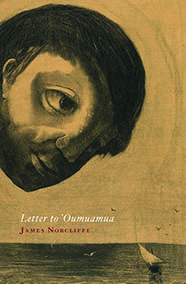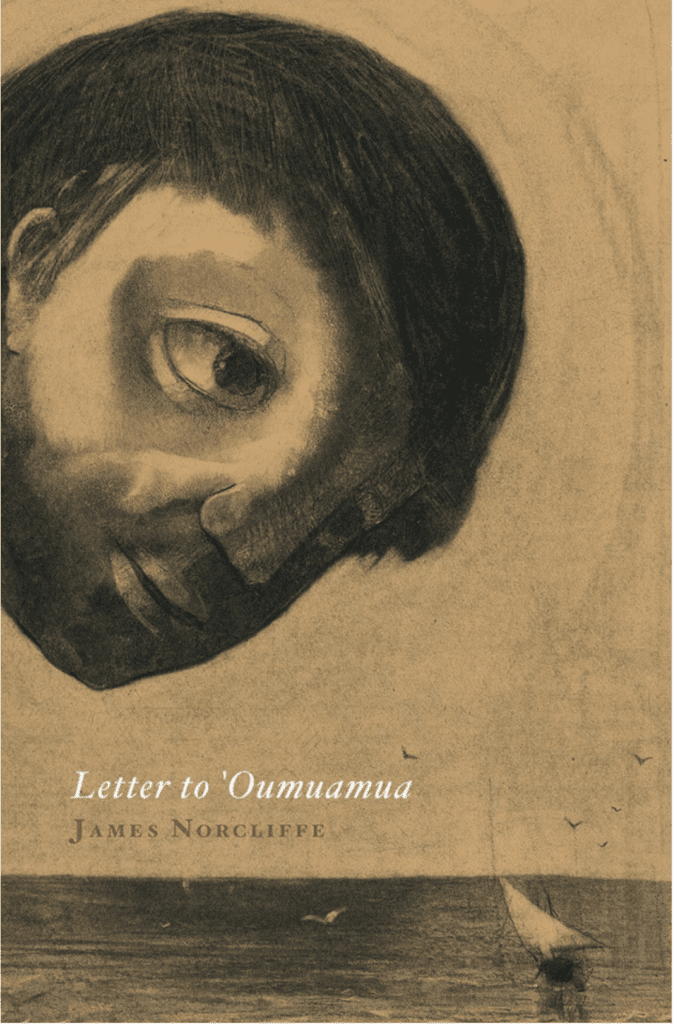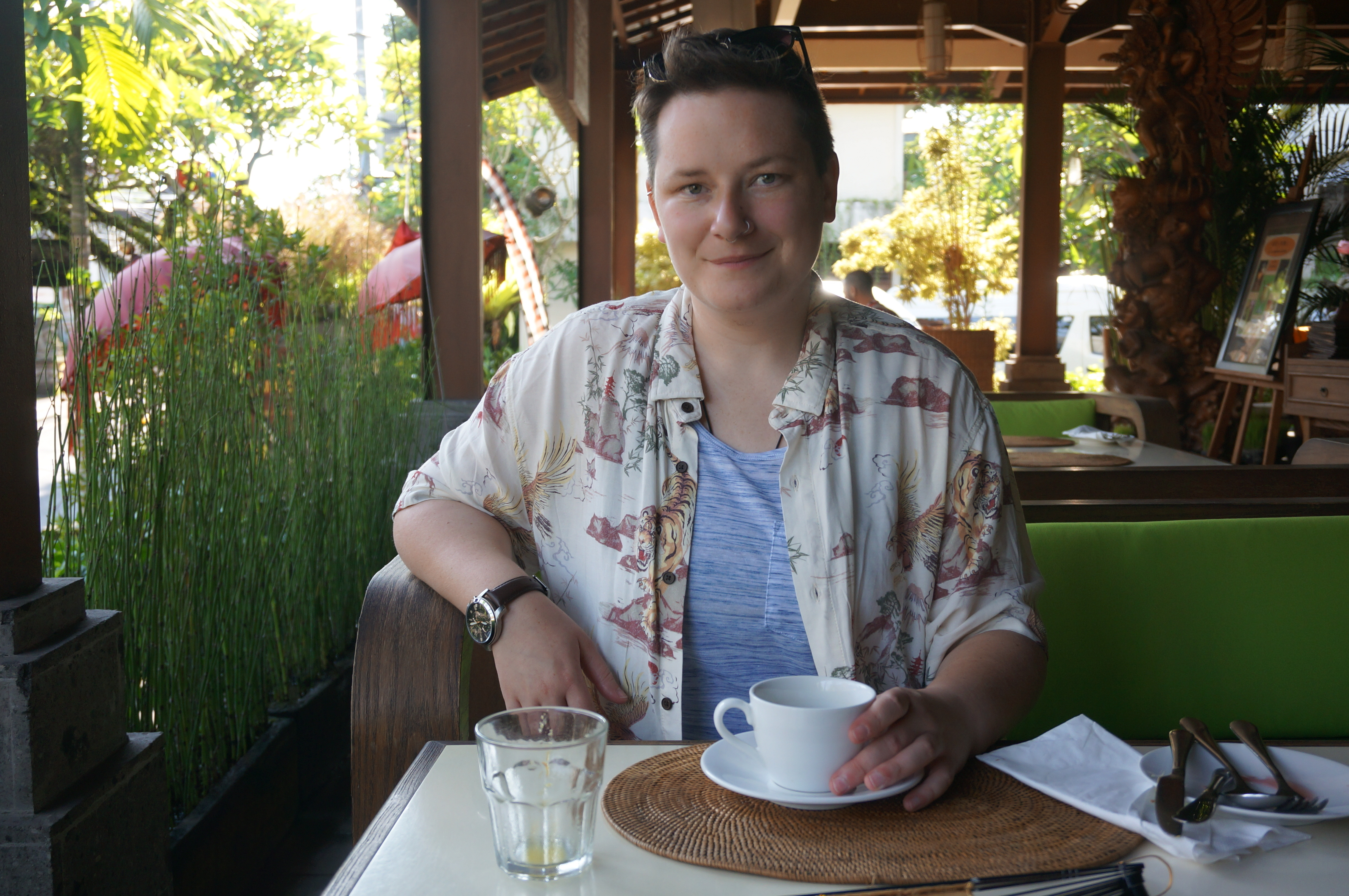Letter to ’Oumuamua

Letter to ’Oumuamua by James Norcliffe. OUP (2023) RRP: $25.00. Pb, 96 pp. ISBN 9781990048517. Reviewed by Ray Shipley
‘Oumuamua, Norcliffe tells us in his notes of his 11th collection of poetry, was the name given to the first interstellar object to pass through our solar system, first detected in 2017. Asteroid, comet, or perhaps a product of alien technology, its name is a Hawaiian word meaning ‘scout’ or ‘messenger’. And on the cover of this wide-reaching collection, we see a large face, curious, wise and open, looking down on a very small sailboat—’Oumuamua personified, perhaps, looking down on the sailboat Earth.
The first poem in this collection shares its title with the book, and is a striking and wistful letter to this strange, fleeting visitor:
I note you didn’t hang around, dear ’Oumuamua: one brief
look was all it took before you hoisted your great light sail
and hightailed it out of here. (p. 11)
This sets the scene for the whole collection—which, through this lens of a letter to this extraterrestrial visitor, reads as an exploration of what it is to be human, on this specific planet, at this specific time. There’s little judgement in these pages, but keen, glorious observation of our oddities, our challenges, our celebrations. These poems weave and dive through weighty topics—climate change, grief, ageing—with a light, clever touch that works beautifully on a first read, and gives more and more with each visit. Take Really Hot Soup, for example—a witty extended metaphor for our warming planet, which seems to become more devastating with each read:
People seem not to appreciate the very real dangers of really hot soup, not even when they’re in it. (p. 45)
Or in Ocean View, where the narrator observes a Granddad on the beach. The poem is familiar, rhythmic like the ocean waves, creating a charming, sweet image that carries a deep undercurrent of nostalgia and uncertainty.
All of his sandcastles
washing away, washing
away like sandcastles. (p. 44)
It’s not just humans and our strange, beautiful behaviours that are given this deep, observant consideration. Nature, too, features heavily, but it’s telling that two of the five sections in this collection include the word ‘unnatural’. Birds of many kinds, pastoral scenes, ocean views, trees and forests all make appearances in these pages—twisted, charmed and changed through our behaviours, our memories, our experiences. In Life after the Diamond Harbour Ferry, the narrator travels across the water in a struggling ferry:
You take my hand and try to comfort me. We must not allow our lives to be
dominated by personification, you whisper.
The jetty seems a little closer. Two black-backed gulls are perched on the railing.
She is quite right, one screeches. Listen to her. (p. 89)
Or in Dear Contributor, where an imagined editor names a number of ‘useful and beautiful trees’ (p. 13) that they are unwilling to sacrifice to publish a writing contribution. In this collection, the natural world is often just out of reach—a ‘glorious morning’ is ordered online, a forest is contained behind a fence, birds ‘(know) what we are, they lift / into the air crying at our approach.’
For me, perhaps what strikes most strongly about Letter to ’Oumuamua is how wonderfully funny it is, and how comfortably Norcliffe is able to hold wit, delight, and silliness together with tenderness and feeling. Some of these poems made me laugh out loud. Some made me gasp. The movement and fluidity in this collection keeps the reader on their toes, requires close attention, and invites us to expand our outlook.
By the end I had the sense that I’d been at a long, intimate dinner with a few dear friends, playful and despairing in the same mouthful, laughing and marvelling at the deep absurdity of being alive. I enjoyed Letter to ’Oumuamua immensely, and will return to it often—for a shift in perspective, for when I am stuck taking something too seriously (or not seriously enough), for when I need a reminder that there is beauty to be found in these worrying times. In Norcliffe’s words to ’Oumuamua:
I’m not saying come back, dear ’Oumuamua, we do know what
we’re doing. We’re not all bad. We just can’t help ourselves. (p. 11)
Ray Shipley is an Ōtautahi-based comedian, poet, and bookseller. In 2019, Ray was nominated for the Billy T Award, the biggest award for the rising stars of comedy in Aotearoa. Ray has won the Christchurch Poetry Slam four times, and placed third nationally in 2018. Their poetry can be found in the anthologies Solid Air (UQP, 2019), and in Out Here (AUP, 2021), among others.

